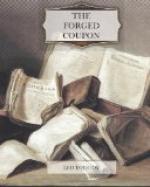This clearly is a study from life, a leaf from Tolstoy’s “Crimean Journal.” It harmonises with the point of view revealed in the “Letters from Sebastopol” (especially in the second and third series), and shows, like them, the change effected by the realities of war in the intolerant young aristocrat, who previously excluded all but the comme-il-faut from his consideration. With widened outlook and new ideals he returned to St. Petersburg at the close of the Crimean campaign, to be welcomed by the elite of letters and courted by society. A few years before he would have been delighted with such a reception. Now it jarred on his awakened sense of the tragedy of existence. He found himself entirely out of sympathy with the group of literary men who gathered round him, with Turgenev at their head. In Tolstoy’s eyes they were false, paltry, and immoral, and he was at no pains to disguise his opinions. Dissension, leading to violent scenes, soon broke out between Turgenev and Tolstoy; and the latter, completely disillusioned both in regard to his great contemporary and to the literary world of St. Petersburg, shook off the dust of the capital, and, after resigning his commission in the army, went abroad on a tour through Germany, Switzerland, and France.
In France his growing aversion from capital punishment became intensified by his witnessing a public execution, and the painful thoughts aroused by the scene of the guillotine haunted his sensitive spirit for long. He left France for Switzerland, and there, among beautiful natural surroundings, and in the society of friends, he enjoyed a respite from mental strain.
“A fresh, sweet-scented flower seemed to have blossomed in my spirit; to the weariness and indifference to all things which before possessed me had succeeded, without apparent transition, a thirst for love, a confident hope, an inexplicable joy to feel myself alive.”




